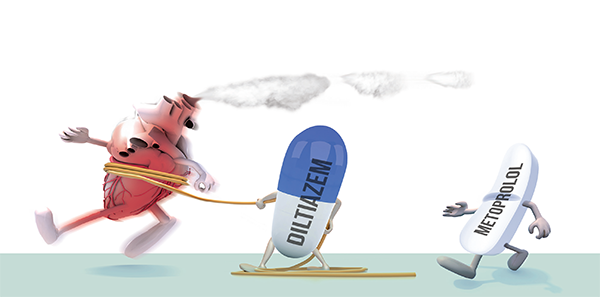
Case: A 49-year-old man with no past medical history presents to the ED with palpitations for five days. He feels tired and a little short of breath but has no chest pain. His vital signs are normal except for a heart rate of 142 beats per minute (bpm). You palpate his pulse and find it irregularly irregular. An ECG confirms rapid atrial fibrillation.
Explore This Issue
ACEP Now: Vol 35 – No 01 – January 2016Question: In patients with rapid atrial fibrillation, what medication will obtain rate control faster: a beta blocker or a calcium channel blocker?
Background: Atrial fibrillation is a common presentation to the ED, with atrial flutter being less common. There has been controversy as to whether rhythm control is better than rate control for these dysrhythmias. An aggressive rhythm control protocol demonstrating efficacy and safety for early-onset atrial fibrillation or flutter (AFF) has been published.1
Rhythm control would not be an option in this case because this man’s symptoms have been present for five days. Rate control is the treatment of choice for stable patients with atrial fibrillation >48 hours or an unknown time of onset with a rapid ventricular response.2 However, there is limited evidence on whether beta blockers or calcium channel blockers are better for achieving rate control.3
There has been controversy as to whether rhythm control is better than rate control for these dysrhythmias.
Relevant Article: Fromm C, Suau SJ, Cohen V, et al. Diltiazem vs. metoprolol in the management of atrial fibrillation or flutter with rapid ventricular rate in the emergency department. J Emerg Med. 2015;49(2):175-182.
- Population: Adult patients >18 years old presenting with atrial fibrillation or atrial flutter. There were many exclusions listed in the paper.
- Intervention: Diltiazem 0.25 mg/kg (max dose of 30 mg) or metoprolol 0.15 mg/kg (max dose of 10 mg) IV.
- Comparison: As above.
- Outcome:
- Primary: Heart rate <100 bpm within 30 minutes.
- Safety: Heart rate <60 bpm and systolic blood pressure <90 mmHg.
Authors’ Conclusions: “Diltiazem was more effective in achieving rate control in ED patients with AFF and did so with no increased incidence of adverse effects.”
Key Results: There were 28 patients randomized to the metoprolol group and 24 in the diltiazem group. About two-thirds of the patients were new-onset atrial fibrillation. The mean age was 66 years, and 47 percent were men.
Primary Outcome: HR<100 bpm at 30 minutes 96 percent diltiazem vs. 46 percent metoprolol (number needed to treat=2)
No difference was noted between the groups in terms of bradycardia or hypotension.
Pages: 1 2 3 | Single Page

 ACEP Now features one article each issue related to an ACEP eCME CME activity.
ACEP Now features one article each issue related to an ACEP eCME CME activity.




2 Responses to “Diltiazem Achieves More Rapid Rate Control in Atrial Fibrillation than Metoprolol”
January 24, 2016
HCAnyone adding IV magnesium to IV Cardizem & obtaining higher success of spontaneous conversion?
December 26, 2016
FMarkMoore/MDIs it safer to do a TE echo first to determine clots in non anticoagulated patients off the street?